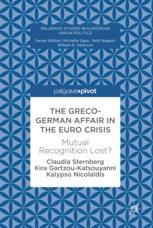

Most ebook files are in PDF format, so you can easily read them using various software such as Foxit Reader or directly on the Google Chrome browser.
Some ebook files are released by publishers in other formats such as .awz, .mobi, .epub, .fb2, etc. You may need to install specific software to read these formats on mobile/PC, such as Calibre.
Please read the tutorial at this link: https://ebookbell.com/faq
We offer FREE conversion to the popular formats you request; however, this may take some time. Therefore, right after payment, please email us, and we will try to provide the service as quickly as possible.
For some exceptional file formats or broken links (if any), please refrain from opening any disputes. Instead, email us first, and we will try to assist within a maximum of 6 hours.
EbookBell Team

4.0
26 reviewsThis book focuses on one of the most highly charged relationships of the Euro crisis, that between Greece and Germany, from 2009 to 2015. It explores the many ways in which Greeks and Germans represented and often insulted one another in the media, how their self-understanding shifted in the process, and how this in turn affected their respective appraisal of the EU and that which divides us or keeps us together as Europeans. These stories illustrate the book’s broader argument about mutual recognition, an idea and norm at the very heart of the European project. The book is constructed around a normative pivot. On one hand, the authors suggest that the tumultuous affair between the two peoples can be read as “mutual recognition lost” through a thousand cuts. On the other, they argue that the relationship has only bent rather than broken down, opening the potential for a renewed promise of mutual recognition and an ethos of “fair play” that may even re-source the EU as a whole. The book’s engaging story and original argument may appeal not only to experts of European politics and democracy, but also to interested or emotionally invested citizens, of whatever nationality.